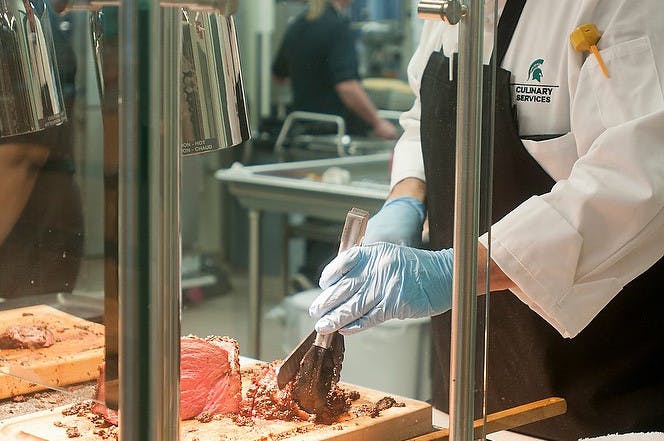Death, taxes, and MSU dining halls being busy at all hours — three things that are guaranteed to occur. Though the operation can get hectic, the dining experience on campus is a dependable option for students.
Meeting the demand of tens of thousands of students, staff and visitors across the university requires preparation. Senior Chef Executive Kurt Kwiatkowski and Associate Director of Residential Dining Don Donagrandi are the two masterminds behind MSU's dining hall operation.
“We work on a four-week menu cycle,” Kwiatkowski said. “There are certain platforms that run a static menu all the time … We allow for flexibility, so that if we happen to be long on an item, or have some extra of something come in, we have the ability to work it out.”
The variation of food items allows the dining halls to serve base foods such as cheeseburgers or chicken patties daily, while certain meals are set to be distributed at other dining stations that change constantly.
In terms of preparation, the menus become final months in advance. Kwiatkowski said the fall semester menus are written by the end of April or early May to be uploaded in the dining hall system before move-in. Spring semester menus are planned around the second week in August.
Kwiatkowski said guest feedback and items of certain equipment are the main factors that help decide what specific foods are served daily and what runs on the cycle.
“We try to have a nice mix, so hopefully there is comfort food,” Kwiatkowski said. “Then we try to infuse different ethnic dishes globally.”
Students agree that variation in menus is helpful for a positive dining experience.
“I feel like every dining hall has enough to offer if you just go in there for lunch or dinner it gives you enough to pick from,” psychology freshman Lauren Tuohy said.
Tuohy said the ability to travel and eat at different dining halls is also a good opportunity.
“I feel like the buses help because they are all kind of spread out, but other than that it’s at most like a twenty-minute walk so it’s not bad,” Tuohy said.
Business freshman Kennedy Marsh is also satisfied with the diversity in the dining halls.
“I think each dining hall has at least one station that adds diversity and good food for different cultures,” Marsh said. “They have gluten free options and vegetarian options so anyone can choose at least something.”
The mixture of choices can be attractive, however some say the options aren't enough.
“I mean, there’s a lot of different options," computer science sophomore Patrick Oleksik said. "Only two of the options really change, so if I want to get something different, it is not that easy."
Kwiatkowski encourages students to share feedback so MSU's dining experience can be improved.







